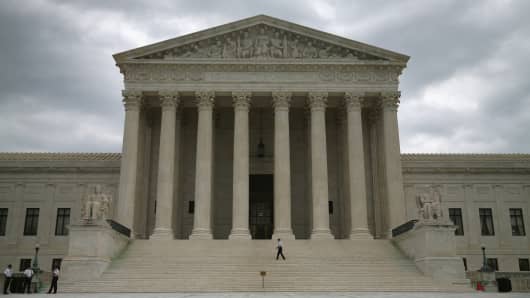Fundamental belief premises of American democracy are that we are a "nation of laws, not men" and that law and power are not two sides of the same coin. The outcome — and the reaction to the outcome — of this year's challenge to an important provision of the Affordable Care Act (ACA) will challenge those beliefs.
In King v. Burwell, the Supreme Court will decide the lawfulness of an Internal Revenue Service regulation which authorizes the payment of federal tax subsidies to pay for health insurance under the ACA to taxpayers in every state without regard to whether the taxpayer purchases the insurance through a federally-established (as distinguished from a state-established) health-insurance exchange. The practical consequences of the case are enormous: 34 states did not establish an exchange, and thus a federal exchange operates in those states; in 2014, about 5 million of citizens purchased insurance in those 34 states; and, absent tax subsidies, most of those 5 million people could not afford to purchase insurance.
Read MoreOp-ed: The Great Obamacare Medicaid Bait 'n' Switch
The parties' briefs before the Supreme Court present the case, as one would expect, as a case about statutory construction — is the ACA ambiguous (or not) and is the agency interpretation of the statute permissible (or not)? While principles of statutory construction provide the legal and rhetorical framework, King is as much politics and political preferences as law, with the case being only the next major chapter in the divisive political debate over the ACA.
No one (including the plaintiffs in the case, I submit) really believes that the Democrats in Congress who passed the ACA (and it was Democrats who passed it) actually intended to exclude citizens in "federal exchange states" from tax subsidies and, therefore, to effectively exclude those citizens from having health insurance. And yet, and this is the plaintiffs' forceful point, the ACA provision which addresses the question of the "premium assistance amount" speaks directly of persons "enrolled in through an exchange established by the state."
Read MoreGOP moving to create alternative to Obamacare
From that language, plaintiffs argue that no fair reading of "established by the state" can mean "established by the State or established by the federal government." The government, for its part, argues that plaintiffs selectively and misleadingly extract "established by the state" from the overall context and purpose of the statute, creating unanticipated, if not absurd, results. Oddly, perhaps, both arguments are correct.
Congress no doubt intended for citizens of "federal exchange states" to receive tax subsidies and denying subsidies in "federal exchange states" will cause, as the government says, great hardship and undermine the ACA's purpose. At the same time, the plain text of the directly relevant provision ("established by the state") is contrary to the government's construction which interprets "established by the state" to include "established by the federal government."
Read MoreObamacare year two: More clueless than ever
In the end, a more-than-credible, citation-laden opinion can be written holding in favor of either side with an equally credible dissent written for the other side. If the government is to prevail, the scale will likely be tipped by institutional considerations. A majority of the court may conclude that it is already too late in the day and too large an undertaking for the court to unravel the most significant piece of social legislation enacted since the 1960's. The disruption would be enormous. On the other hand, if the plaintiffs prevail, the majority will wrap itself in the statute's plain language in a critical subsection and assert that "if we are wrong in our understanding of what Congress intended, then, of course, Congress is free to fix it."
The administration has been silent as to whether it has a proposed fix at the ready, but sadly the notion that Congress will enact a fix which the president would sign is altogether fanciful. Our politics is too poisoned for that.
Commentary by Ralph Tyler, a partner in the Washington and Baltimore offices of law firm Venable LLP, where he focuses on state and federal regulatory issues and civil litigation, including appeals. Previously, he served as chief counsel at the U.S. Food and Drug Administration (FDA) and insurance commissioner for the state of Maryland.


